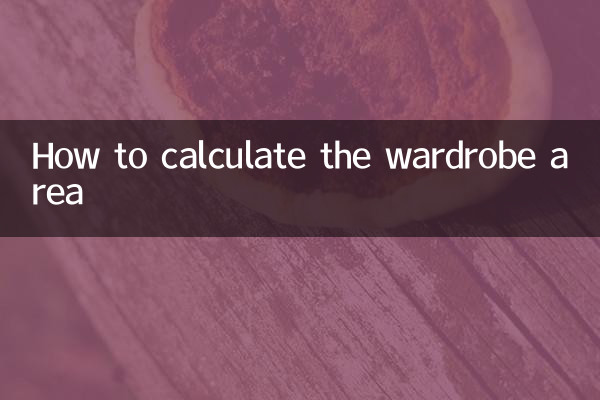How to calculate the wardrobe area
Calculating the area of the wardrobe is a key step when decorating homes or customizing furniture. Whether you are buying a finished wardrobe or a custom wardrobe, knowing how to accurately calculate the wardrobe area can help you better plan your space and budget. This article will introduce in detail the calculation method of wardrobe area and provide structured data for your reference.
1. Basic concept of wardrobe area

The area of a wardrobe usually refers to the projection area or expansion area of the wardrobe. The projected area refers to the projected size of the wardrobe on the wall, while the spread area refers to the total area of all the boards in the wardrobe. The following are detailed descriptions of the two calculation methods:
| Calculation method | formula | Applicable scenarios |
|---|---|---|
| Projection area | Height × Width | Finished wardrobe or simple custom wardrobe |
| Expanded area | Sum of all plate areas | Complex custom wardrobe |
2. Calculation method of projection area
The projected area is the product of the height and width of the wardrobe. For example, a wardrobe with a height of 2.4 meters and a width of 1.8 meters, the projected area is:
| Height (meters) | Width (meters) | Projection area (square meter) |
|---|---|---|
| 2.4 | 1.8 | 4.32 |
It should be noted that the projected area usually does not include partitions or drawers inside the wardrobe, and these parts may require additional calculations.
3. Calculation method of expanding area
The expanded area refers to the total area of all the boards in the wardrobe. This method is more suitable for complex custom wardrobes, especially those with more internal structures. Here is an example of calculation of expanded area:
| Plate type | quantity | Single block area (square meter) | Total area (square meter) |
|---|---|---|---|
| Side panel | 2 | 2.4 × 0.6 | 2.88 |
| Top plate/bottom plate | 2 | 1.8 × 0.6 | 2.16 |
| Partition board | 3 | 1.8 × 0.4 | 2.16 |
| Door panel | 2 | 2.4 × 0.45 | 2.16 |
| total | - | - | 9.36 |
The calculation of the expanded area is relatively complicated, but it can more accurately reflect the actual materials and costs of the wardrobe.
4. Popular topics: Discussion on wardrobe design in the past 10 days
According to searches across the Internet, popular topics about wardrobe design in the past 10 days include:
| topic | Popularity index | Main discussion points |
|---|---|---|
| Small apartment wardrobe design | ★★★★★ | How to maximize storage capabilities with limited space |
| Selection of environmentally friendly boards | ★★★★☆ | Environmental standards and health impacts of wardrobe materials |
| Smart Wardrobe | ★★★☆☆ | Practicality of smart lighting, automatic dehumidification and other functions |
5. How to choose the appropriate calculation method?
1.Finished wardrobe: Usually calculated by projected area, the price is transparent and easy to compare.
2.Simple custom wardrobe: The projection area calculation is more cost-effective and is suitable for designs with simple internal structures.
3.Complex custom wardrobe: The calculation of the expansion area is more accurate, especially when there are many internal partitions and drawers.
6. Things to note
1. Confirm whether the quotation contains hardware accessories (such as hinges, slides).
2. Pay attention to whether the wall is flat during measurement to avoid errors.
3. Clear calculation methods with designers or merchants to avoid later disputes.
Through the above content, I believe you have a clearer understanding of the calculation of wardrobe area. Whether you choose the projection area or the expansion area, you can create a beautiful and practical wardrobe.

check the details

check the details